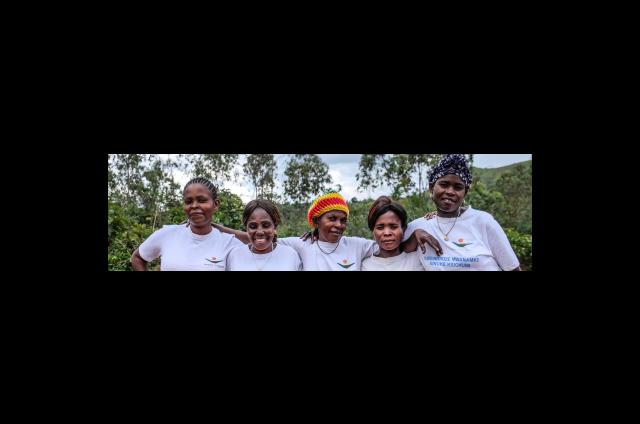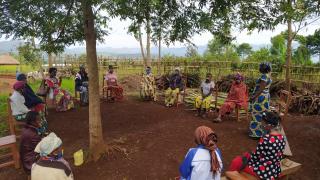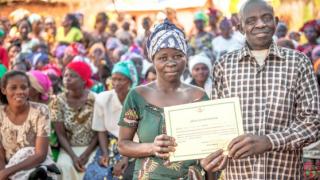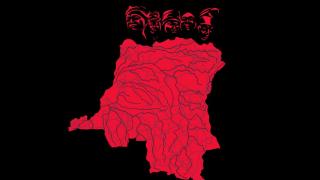DRC RCT results
Uplifting Women’s Futures: Proven Investments in Women in the DRC
Sharing our latest research results
In some of the toughest places in the world, Women for Women International invests in women survivors of war and conflict, connecting them with new knowledge, skills, and resources – and each other – to realize their own power through our Signature Program. Together, they learn to save, build businesses, understand their rights, improve their health, and influence household decisions and societal rules. They pass on this knowledge to their families and communities, creating a world that’s more equal, peaceful, and prosperous.
Rigorous research plays an important role in learning what really works in supporting the most marginalized women to make long-term sustainable change in their lives, families and communities. Our team builds on an existing foundation of strong evidence, and our research contributes to that growing body so more people can work towards a more equitable reality.

Women’s Lives in Eastern Democratic Republic of the Congo
Trapped in a complex web of ongoing conflict, instability, poverty, disease, and extreme gender discrimination, women who are already struggling end up staying at the bottom.
Conflict has destabilised the communities women call home, hindering development, disrupting markets, limiting governance, and destroying assets while threatening women’s safety through sexual violence. Gender norms limit women’s income, access to education, ownership of assets, safety, agency, and power. At the time of enrollment into the program and study:
- Only 14% of women participants attained education higher than primary school.
- Women’s average earnings were $1.57 per week, well below the global poverty line of $1.90 per day.
- 27% of respondents reported experiencing an incident of violence within her household or community in the past year.
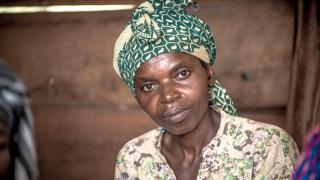
Rigorous Global Research
In collaboration with researchers at the University of Washington, University of Texas at Austin, and Marakuja Kivu Research, Women for Women International conducted a 24-month randomized control trial (RCT) in four communities in South Kivu, Democratic Republic of the Congo.
The study measured the impacts of the Signature Program on women’s livelihoods, savings and assets, social empowerment, well-being, and social assets a year after program completion. Researchers also examined the impact on women participants of having a male household member join Women for Women International’s Men’s Engagement Program (MEP). The MEP engages men to become advocates and allies for gender equality through training of community leaders, followed by discussion groups led by these local leaders with male family and community members.
Researchers also examined the impact on women participants of having a male household member join Women for Women International’s Men’s Engagement Program (MEP).
The MEP engages men to become advocates and allies for gender equality through training of community leaders, followed by discussion groups led by these local leaders with male family and community members.
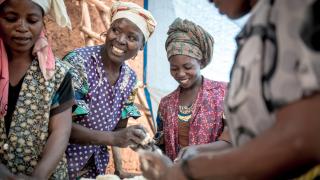
The research demonstrates that an integrated social and economic empowerment program can improve the lives of marginalized women in conflict-affected eastern DRC.
One year after program completion, compared to women in the control group, graduates of the program had:
- Increased their savings, including a three-fold increase in their average personal savings, a doubling in the proportion of households with savings, and a doubling in average household savings. The gains in the household were driven by women’s own higher savings.
- Increased their access and usage of credit, including improving their financial inclusion via participation in Village Savings and Loan Associations, where they had a source to access, use and benefit from credit.
- Increased their earnings, including 1.6 times higher weekly gross earnings and a shift from wage labor to entrepreneurship.
- Increased their assets, including gains in the value of household assets and in the percentage of women with legal control over land.
Compared to women in the control group a year after graduating, graduates of the program had also:
- Improved their health and well-being, including improved household diet diversity and decreased rates of anxiety,
- Increased agency and decision making, including feelings of more control over their own lives and increased participation in making decisions in their households, and
- Increased social inclusion and networking, including increased participation in community groups and access to social support and an increase in women’s belief that women can lead in their communities.
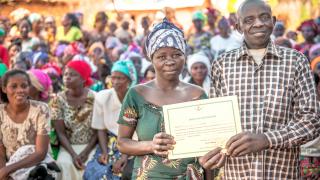
More Time and Tailored Approaches to Shift Gender Norms, Reduce Violence, and Engage Men to Empower Women
Along with the positive and significant impacts on women’s social and economic well-being, the research highlighted areas for improvement: women’s overall attitudes about gender norms and women’s reported experiences of intimate partner violence did not change during this study period.
Having a spouse or male household member in MEP also did not lead to additional gains for women in key outcome areas. Women for Women International understands that attitudes and behaviors around gender norms take time and targeted efforts to change. The results demonstrate a need for larger and longer investments, especially at the community level, to cultivate an environment where all women use their power and reach their full potential.
Women’s Futures in the DRC
Even when faced with frequent shocks and crises that can disrupt lives and communities, women made significant and sustainable gains in social and economic outcomes from participation in the Signature Programme. This study proves a bundled approach can help women improve their lives despite conflict, poverty and gender discrimination. With a stronger foundation for confidence, self-sufficiency and financial stability, women made changes based on their vision for their own power, their families and their communities. An equitable future for the DRC calls for intentional and widespread investment in women.
- Women for Women International has begun the process of incorporating lessons from this research into the Signature Programme. Our roadmap for improving our programming includes investments in:
- Individualised support for women’s specific needs and causes of marginalization.
- Fostering a more supportive environment for women’s power by engaging household and community members with more intentional and longer-term approaches.
- Integrating lessons from other proven models to reduce IPV.
As we move forward, we are eager to partner with governments, NGOs, and other organizations to continue the work of both supporting women survivors of war and improving that support to achieve a world where every woman can use her power.
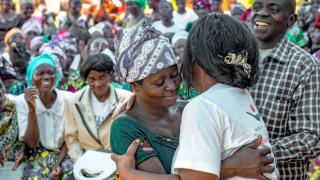
Acknowledgements
This intervention trial is a collaborative project of Women for Women International, Dr. Rachel Heath, University of Washington, and Dr. Manuela Angelucci, University of Texas at Austin. The research team would like to thank the participants of this study for sharing their time and experiences, the Women for Women International program implementation staff and the data collection teams, Marakuja Kivu Research and Innovative Hub for Research in Africa (IHfRA).
Learn more about our work in the DRC
A Silver Lining in the DRC
subtitle:
Amid all the heavy headlines of things COVID-19 has changed or stalled, we are happy to share with you a silver lining: We are resuming our in-person trainings in the Democratic Republic of the Congo!
Friday Focus:
subtitle:
Why women in eastern DRC are campaigning for marriage registration.
03 JUNE, 2019 | THE INDEPENDENT
This month's instalment in the Forgotten Women series by The Independent features the stories of women enrolled in our year-long programme in the Democratic Republic of Congo. The DRC is a country that’s been torn apart by warfare and power struggles, and where millions live in poverty. Read the stories of the women who are trying to rebuild their lives in a country that has never managed to turn the page of conflict.

